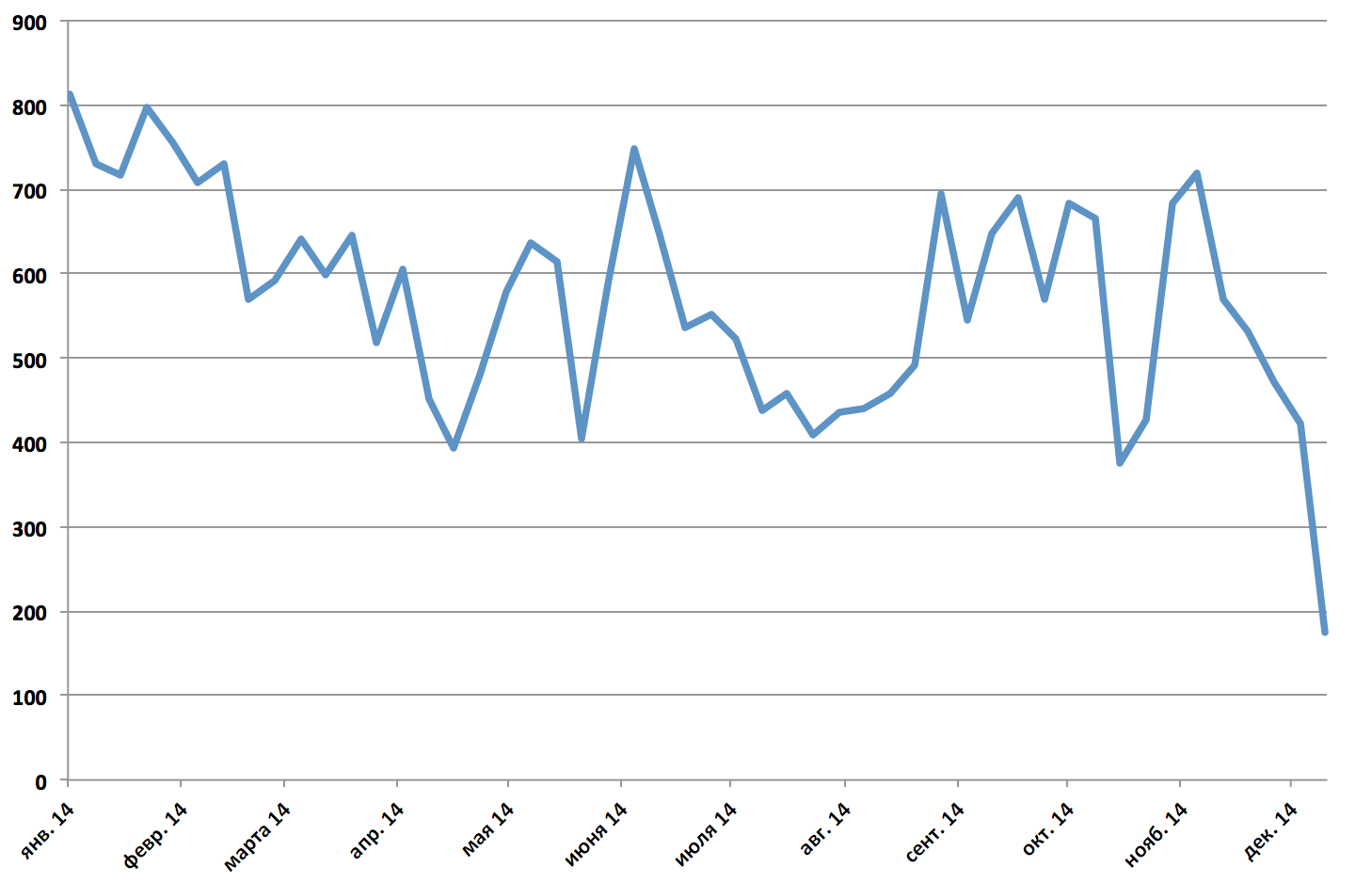SMS spam has come to an end?

October 21, 2014, amendments to the Federal Law came into force. On communications regarding SMS advertising campaigns. Do you remember the time when many newspapers were full of headlines in the style of “SMS-spam will become illegal”, “Russians will get rid of mobile advertising”, “End of SMS-spam”? Similar articles were written including. and quite large and serious publications.
For some reason, then all the journalists (and the deputies, too) amicably "forgot" that SMS spam (namely, sending advertising without the consent of the recipient) was already long ago forbidden, for each such message in accordance with the Federal Law 100 to 500 thousand rubles.
')
But, did spam become less?
In our service for automated dispatch of complaints on SMS spam, we have been keeping statistics since January 20, 2014. The graph presented at the top of the article shows the number of complaints sent to the FAS by our users (those who did not refuse to send anonymous statistics to us) weekly. Yes, the trend is downward - the number of complaints about SMS spam decreases, respectively, the number of spam itself decreases. But what is the merit of this change in the Federal Law On Communications, which entered into force on October 21, 2014? In our opinion - no. The Law on Communication introduces the responsibility of operators for receiving SMS spam by subscribers who “told” the operator that they do not want to receive SMS from a specific number. Are there many such users? Hardly. Does the spammer suffer from this? Not. What is the responsibility of the operator, if the SMS is still received by the subscriber? It is not clear. Maybe some senders of SMS spam were frightened, but judging by the statistics presented by us (see the period October-December 2014) - there are few of these. Significant reduction in SMS spam was observed only on the first New Year week, but there is a reason for this — very few people worked these days, the senders of spam also rested.
However, it can be said for sure that due to a large number of complaints to the FAS against SMS spam, the amount of spam is gradually decreasing. The FAS may rarely file cases with senders of spam (see data below), but apparently they often send requests for information to them — accordingly, senders know what they can expect.
Other interesting statistics
We analyzed the content of about 28'000 advertising SMS-messages (from about 14'000 senders) received by those users who agreed to anonymously share such information with us.
It turned out that the most popular word in SMS spam is a discount:
| word | number of mentions |
|---|---|
| a discount | 3707 |
| to call | 2874 |
| day | 2064 |
| Taxi | 2046 |
| credit | 2001 |
| car | 1998 |
| money | 1951 |
| only | 1910 |
| the whole | 1884 |
| price | 1647 |
| present | 1638 |
| SMS | 1544 |
| new | 1439 |
| your | 1368 |
| is free | 1356 |
| any | 1332 |
| stock | 1228 |
| year | 1207 |
| receive | 1005 |
| map | 980 |
| detail | 952 |
| loan | 919 |
| order | 900 |
| everything | 897 |
| free | 888 |
| code | 842 |
| number | 837 |
| Ltd | 836 |
| mts | 775 |
| bank | 773 |
The most popular brand mentioned in the text of messages is MTS:
| brand | number of mentions |
|---|---|
| mts | 775 |
| Rolf | 560 |
| beeline | 360 |
| Mercedes | 285 |
| Mitsubishi | 280 |
| vk | 232 |
| Sberbank | 190 |
| qiwi | 186 |
| Ford | 177 |
Most often complained about the sender - promo:
| sender |
|---|
| promo |
| wurussia |
| conf |
| hobocti |
| 900 |
| mts-partner |
| time + money |
| 79029551350 |
| 79029550877 (nano-finance) |
| mtc |
Unfortunately, the FAS and its territorial divisions (FAS) rarely really find the senders of spam:
- Moscow OFAS: the number of applications in 2013 is 1000, in 2014 - more than 2000, but only 2 million rubles in fines.
- St. Petersburg OFAS: fines are also only 2 million rubles. (25 violators), while 2/3 of calls to FAS are sent to SMS spam .
- UFAS of Tatarstan: the number of complaints against SMS spam increased 25 times ( 890 complaints in 9 months of 2014 ), 500 cases were initiated, but only 58 were recognized as a violation.
- Novgorod OFAS: 350 calls in 2014, 13 cases in total.
The cases of punishment of operators Roskomnadzor (who monitors the implementation of the Federal Law On Communications, including the amendments of October 21) are unknown to us.
Maybe FAS_RF and [there should be Roskomnadzor's nickname on Habré / GeekTimes] can tell us something interesting?
Source: https://habr.com/ru/post/375331/
All Articles